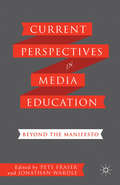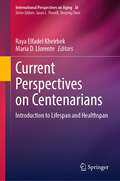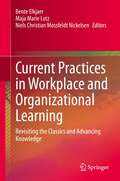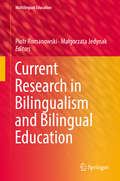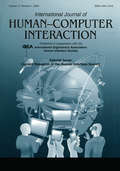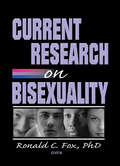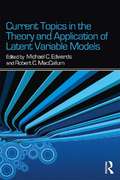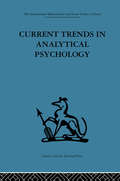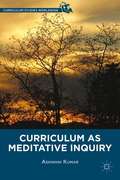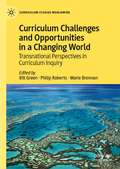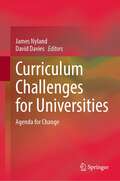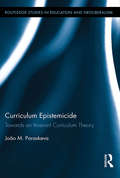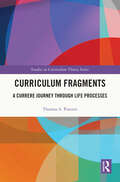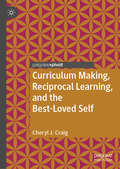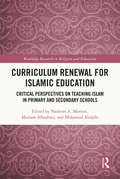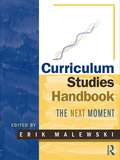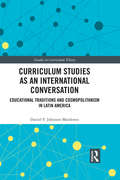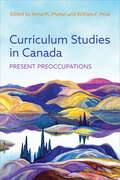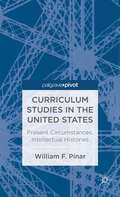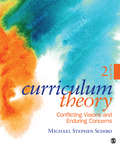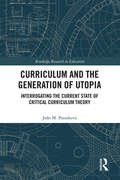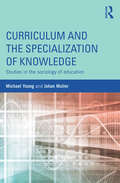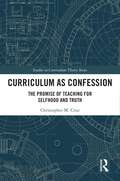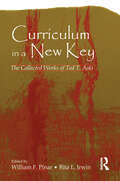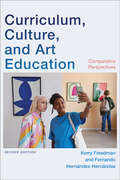- Table View
- List View
Current Perspectives in Media Education: Beyond the Manifesto (Education, Economy And Society Ser.)
by J. Wardle P. FraserThis book emerged from the online project 'A Manifesto for Media Education' and takes forward its starting points by asking some of the original contributors to expand upon their view of the purpose of media education and to support their perspective with accounts of practice.
Current Perspectives on Centenarians: Introduction to Lifespan and Healthspan (International Perspectives on Aging #36)
by Maria D. Llorente Raya Elfadel KheirbekThis book explores various aspects related to human longevity and aging beyond 100 years old. It examines all domains of health and well-being of this elite group including the current demographics, genetics and epigenetics of exceptional longevity, cardiovascular risk factors, dementia, nutrition, physical activity, African American and Hispanic centenarians, financial planning, religion, spirituality, whole health, wellness, oral health, and nature. The book also delves into the lives of supercentenarians, defined as expert survivors who have lived beyond 110 years old. The implications of the Age-Friendly Healthcare Systems (AFHS) Movement on the care of centenarians are also discussed. This book is a valuable resource for healthcare professionals, epidemiologists, public health professionals, policy makers, and anyone interested in the study of aging and longevity.
Current Practices in Workplace and Organizational Learning: Revisiting the Classics and Advancing Knowledge
by Bente Elkjaer Maja Marie Lotz Niels Christian Mossfeldt NickelsenThe central assumption that guides this book is that research and practice about learning at the workplace has recently lost its critical edge. This book explores what has happened to workplace learning and organizational learning and studies what has replaced it. In addition, the book discusses to what extend there are reasons to revitalize it. Today, themes such as ‘innovation’, ‘co-creation’ and ‘knowledge sharing’ seem to have become preferred and referred to as theoretical fields as well as fields of practice. In several chapters of this book it is argued that the critical power of learning could be regained by starting a new discussion of how these new fields of practice can be substantiated by topics such as learning arrangements, learning mechanisms, and learning strategies. Hence, the aim of this book is to both advance and recapture our knowledge of learning in today’s increasingly complex world of work and organizing. The contributions in this work do so by revisiting classic research on workplace and organizational learning and discussing how insights from this body of literature evokes new meaning. It sets the stage for new agendas and rethinks current practices that are entangled in activities such as innovation, co-creation, knowledge sharing or other currently widespread fields of practice.
Current Research in Bilingualism and Bilingual Education (Multilingual Education #26)
by Piotr Romanowski Małgorzata JedynakThis book covers research topics in bilingual education, language policies, language contact, identity of bilingual speakers, early bilingualism, heritage languages, and more, and provides an overview of current theory, research and practice in the field of bilingualism. Each chapter is written by a specialist in the field. Part I focuses on the numerous and heterogeneous relations between languages as well as the implications arising from bilingual speech processing. In Part II, a series of contextualized studies on bilingual classrooms are presented, with diverse research designs applied in different educational settings being a key feature of these studies. Part III bridges theory and practice by offering an insight into mono- and multilingual school settings showcasing examples of educational institutions where bilingualism successfully soared and depicts the needs related to language education.
Current Research of the Human Interface Society: A Special Issue of the international Journal of Human-computer Interaction
by Osamu KataiThis special issue is the first opportunity to introduce the research activities of the Human Interface Society. The first article gives a microworld approach to identify design requirements for better situation awareness. Next, a focus on evaluation of organizational structure in emergency situations from the communication viewpoints is examined,
Current Research on Bisexuality
by Ronald FoxCurrent Research on Bisexuality is an important resource on recent psychological and sociological findings in bisexual studies. The authors provide research findings and case studies that add to our understanding of bisexual identity, bisexuality and relationships, bisexuality and ethnicity, and attitudes toward bisexual people. This book examines research findings, literature reviews, and a wealth of resources that currently exist on bisexuality and bisexual issues. This book will bring you up to date on: bisexual identity development bisexuality in college students cross-orientation friendships of bisexual women bisexual married women and men-and their spouses bisexuality and heterosexually married couples monogamous as well as open bisexual relationships the interrelationship of bisexuality, race, and ethnicity attitudes toward bisexual women and bisexual men Current Research on Bisexuality also contains a comprehensive reader&’s guide to the current social science literature about bisexuality. This bibliography brings together a wide range of nonfiction books, journal articles, book chapters, theses, and dissertations on bisexuality with a focus in the theoretical, research clinical, and community perspectives that have that have developed in the last twenty years. This reading list is essential for students, educators, researchers, and practitioners in psychology, counseling, social work, psychiatry, education, sociology, and anthropology. Current Research on Bisexuality provides new knowledge of the life experiences of bisexual people. With this book, you&’ll find a basis for further research and education about bisexuality in the greater context of ongoing research, education, and advocacy regarding lesbian, gay, bisexual, and transgender issues.
Current Topics in the Theory and Application of Latent Variable Models
by Michael C. Edwards Robert C. MacCallumThis book presents recent developments in the theory and application of latent variable models (LVMs) by some of the most prominent researchers in the field. Topics covered involve a range of LVM frameworks including item response theory, structural equation modeling, factor analysis, and latent curve modeling, as well as various non-standard data structures and innovative applications. The book is divided into two sections, although several chapters cross these content boundaries. Part one focuses on complexities which involve the adaptation of latent variables models in research problems where real-world conditions do not match conventional assumptions. Chapters in this section cover issues such as analysis of dyadic data and complex survey data, as well as analysis of categorical variables. Part two of the book focuses on drawing real-world meaning from results obtained in LVMs. In this section there are chapters examining issues involving assessment of model fit, the nature of uncertainty in parameter estimates, inferences, and the nature of latent variables and individual differences. This book appeals to researchers and graduate students interested in the theory and application of latent variable models. As such, it serves as a supplementary reading in graduate level courses on latent variable models. Prerequisites include basic knowledge of latent variable models.
Current Trends in Analytical Psychology: Proceedings of the first international congress for analytical psychology
by Gerhard AdlerTavistock Press was established as a co-operative venture between the Tavistock Institute and Routledge & Kegan Paul (RKP) in the 1950s to produce a series of major contributions across the social sciences. This volume is part of a 2001 reissue of a selection of those important works which have since gone out of print, or are difficult to locate. Published by Routledge, 112 volumes in total are being brought together under the name The International Behavioural and Social Sciences Library: Classics from the Tavistock Press. Reproduced here in facsimile, this volume was originally published in 1961 and is available individually. The collection is also available in a number of themed mini-sets of between 5 and 13 volumes, or as a complete collection.
Curriculum As Meditative Inquiry
by Ashwani KumarKumar asks in this volume: Since characteristic features of human consciousness - fear, conditioning, and fragmentation - work against the educational experience, how can we re-imagine curriculum as a space for meditative inquiry and allow it to provide transformative educational experiences to teachers and their students?
Curriculum Challenges and Opportunities in a Changing World: Transnational Perspectives in Curriculum Inquiry (Curriculum Studies Worldwide)
by Marie Brennan Bill Green Philip RobertsThis book brings together voices and perspectives from across the world and draws in a new generation of curriculum scholars to provide fresh insight into the contemporary field. By opening up Curriculum Studies with contributions from twelve countries—including every continent—the book outlines and exemplifies the challenges and opportunities for transnational curriculum inquiry. While curriculum remains largely shaped and enabled nationally, global policy borrowing and scholarly exchange continue to influence local practice. Contributors explore major shared debates and future implications through four key sections: Decolonising the Curriculum; Knowledge Questions and Curriculum Dilemmas; Nation, History, Curriculum; and Curriculum Challenges for the Future.
Curriculum Challenges for Universities: Agenda for Change
by David Davies James NylandThis book develops a progressive program of engagement with issues, problems and critical thinking which helps universities and students understand and engage with some of the key issues of our time. It focuses on curriculum concerns, and presents a sustained and critical analysis and dialogue about knowledge, culture and ways of seeing important issues. This book provides critical and analytical insights into the importance of the emergence of mass higher education into public awareness. It explores what is termed ‘contested knowledge’ as part of modern students’ experiences and expectations. By broadcasting some of the future prospects for a democratic university, especially in relation to its communities, it highlights the need to grasp the significance of global change and instability in teaching and learning, and how an adequate curriculum in higher education can be constructed to address the issues that arise.
Curriculum Epistemicide: Towards An Itinerant Curriculum Theory (Routledge Studies in Education, Neoliberalism, and Marxism)
by João M. ParaskevaAround the world, curriculum – hard sciences, social sciences and the humanities – has been dominated and legitimated by prevailing Western Eurocentric Anglophone discourses and practices. Drawing from and within a complex range of epistemological perspectives from the Middle East, Africa, Southern Europe, and Latin America, this volume presents a critical analysis of what the author, influenced by the work of Sousa Santos, coins curriculum epistemicides, a form of Western imperialism used to suppress and eliminate the creation of rival, alternative knowledges in developing countries. This exertion of power denies an education that allows for diverse epistemologies, disciplines, theories, concepts, and experiences. The author outlines the struggle for social justice within the field of curriculum, as well as a basis for introducing an Itinerant Curriculum Theory, highlighting the potential of this new approach for future pedagogical and political praxis.
Curriculum Fragments: A Currere Journey through Life Processes (ISSN)
by Thomas S. PoetterThis book builds upon Louise Berman’s late 20th-century framing of life processes to inform school curriculum, by proposing a new curriculum project that extends and reframes Berman in and beyond schooling.Using the well-established curriculum theorizing method, currere, the author focuses on seven life processes, including knowing, loving, losing, growing, forgiving, relating, and hoping. Each of these is approached using currere-oriented, autobiographical fragments – stories from the author’s own lived experiences in education and life – that illuminate the educational, curricular, and pedagogical possibilities of each of the seven processes using past, present, and future perspectives, which the author calls curriculum fragments. These curriculum fragments are tied to historical and contemporary curriculum theorizing and educational theory and practice, in order to suggest considerations for movement for the reader, scholar, educator, and leader. It ultimately asks whether humanity can create a joyful, beautiful, and just curriculum of life for each and every person through schooling and beyond, and consequently, a better world built on love.Focusing on real-life experiences in school and life that have educational implications and that can inform the curriculum, the field of curriculum studies, and the act of curriculum theorizing, this book will appeal to curriculum scholars interested in using currere, understanding patterns of use, participating in the production of curriculum and educational knowledge in the field, and perceiving and using curriculum theorizing as an integral part of their daily work.
Curriculum Making, Reciprocal Learning, and the Best-Loved Self (Intercultural Reciprocal Learning in Chinese and Western Education)
by Cheryl J. CraigThis book revolves around curriculum making, reciprocal learning, and the best-loved self. It draws on extensive school-based studies conducted with teachers in the United States, China, and Canada, and weaves in experiences from other cross-national projects, keynote addresses, archival research, and editorial work. The elucidation of the ‘best-loved self’ drives home the point that teachers are more than the subject matter they teach: they are students’ role models and allies. Curriculum making and reciprocal learning relationships enrich teachers’ and students’ being and becoming as they live curriculum alongside one another—with the goal of more satisfying lives held firmly in view.
Curriculum Renewal for Islamic Education: Critical Perspectives on Teaching Islam in Primary and Secondary Schools (Routledge Research in Religion and Education)
by Nadeem A. MemonThis book demonstrates why and how it is necessary to redesign Islamic Education curriculum in the K-12 sector globally. From Western public schools that integrate Muslim perspectives to be culturally responsive, to public and private schools in Muslim minority and majority contexts that teach Islamic studies as a core subject or teach from an Islamic perspective, the volume highlights the unique global and sociocultural contexts that support the disparate trajectories of Islamic Education curricula. Divided into three distinct parts, the text discusses current Islamic education curricula and considers new areas for inclusion as part of a general renewal effort that includes developing curricula from an Islamic worldview, and the current aspirations of Islamic education globally. By providing insights on key concepts related to teaching Islam, case studies of curriculum achievements and pitfalls, and suggested processes and pillars for curriculum development, contributors present possibilities for researchers and educators to think about teaching Islam differently. This text will benefit researchers, doctoral students, and academics in the fields of secondary education, Islamic education, and curriculum studies. Those interested in religious education as well as the sociology and theory of religion more broadly will also enjoy this volume.
Curriculum Studies Handbook - The Next Moment (Studies in Curriculum Theory Series)
by Erik MalewskiWhat comes after the reconceptualization of curriculum studies? What is the contribution of the next wave of curriculum scholars? Comprehensive and on the cutting edge, this Handbook speaks to these questions and extends the conversation on present and future directions in curriculum studies through the work of twenty-four newer scholars who explore, each in their own unique ways, the present moment in curriculum studies. To contextualize the work of this up-and-coming generation, each chapter is paired with a shorter response by a well-known scholar in the field, provoking an intra-/inter-generational exchange that illuminates both historical trajectories and upcoming moments. From theorizing at the crossroads of feminist thought and post-colonialism to new perspectives that include critical race, currere, queer southern studies, Black feminist cultural analysis, post-structural policy studies, spiritual ecology, and East-West international philosophies, present and future directions in the U.S. American field are revealed.
Curriculum Studies as an International Conversation: Educational Traditions and Cosmopolitanism in Latin America (Studies in Curriculum Theory Series)
by Daniel F. Johnson-MardonesExamining Curriculum Studies from an international perspective, this book focuses on the relations between the Anglo-Saxon and Latin American educational traditions. Informed by William F. Pinar’s conceptualization of curriculum as currere, Johnson-Mardones reconsiders curriculum as an international conversation and advances an intercultural dialogue among educational traditions to put forth a more comprehensive and inclusive theory of curriculum. Moving beyond the Anglo-Saxon space and into the Global South, Johnson-Mardones brings in his own non-Western educational experience to the center of this inquiry, and situates cosmopolitanism as a necessary but complex component of Curriculum Studies.
Curriculum Studies in Canada: Present Preoccupations
by William F. Pinar Anne M. PhelanThe largest specialization in faculties of education in Canada is curriculum studies. Curriculum Studies in Canada represents the present preoccupations of curriculum scholars in Canada. Set against the backdrop of the COVID-19 pandemic, contributors engage with significant themes, among them ongoing efforts at justice for Indigenous Peoples, the continuing arrival of immigrants and refugees, Canada’s complex relationship to the United States, and issues related to the climate crisis. Addressing such realities through the field of curriculum studies and the school curriculum is critical at this historical conjuncture given the complex and shifting intersections of local and global dynamics restricting education. To this end, contributing scholars serve as intellectual activists to address the critical need for understanding curriculum responsive to the vexed relations among schools, nation-building, social reconstruction, and identity development. Their activism yields more sophisticated understandings of what it means to be educated in Canada. Contributors trace the legacy of their work and reflect on their present scholarly preoccupations in light of their past endeavours. In doing so, Curriculum Studies in Canada offers an invitation to readers: to study, remember, dialogue, and navigate an uncertain world with them.
Curriculum Studies in the United States
by William F. PinarPinar documents that the field of curriculum studies in the United States is in the early stages of a second paradigm shift, this time stimulated by present political circumstances. He explains why their acceptance in contemporary scholarship signals their conceptual exhaustion and how recent work in the field begins to surpass them.
Curriculum Theory: Conflicting Visions and Enduring Concerns
by Michael Stephen SchiroThe Second Edition of Curriculum Theory: Conflicting Visions and Enduring Concerns by Michael Stephen Schiro presents a clear, unbiased, and rigorous description of the major curriculum philosophies that have influenced educators and schooling over the last century. The author analyzes four educational visions—Scholar Academic, Social Efficiency, Learner Centered, and Social Reconstruction—to enable readers to reflect on their own educational beliefs and more productively interact with educators who might hold different beliefs.
Curriculum and the Generation of Utopia: Interrogating the Current State of Critical Curriculum Theory (Routledge Research in Education)
by João M. ParaskevaAs a follow-up to Towards a Just Curriculum Theory and Curriculum Epistemicide , this volume illuminates the challenges and contradictions which have prevented critical curriculum theory from establishing itself as an alternative to dominant Western Eurocentric epistemologies. Curriculum and the Generation of Utopia re-visits the work of leading progressive theorists and draws on a complex range of epistemological perspectives from the Middle East, Africa, Southern Europe, and Latin America. Paraskeva illustrates how counter-dominant narratives have been suppressed by neoliberal dynamics through an exploration of key issues including: itinerant curriculum theory, globalization and internationalization, as well as utopianism. Foregrounding critical curriculum theory as a vector of de-colonization and de-centralization, the text puts forth Itinerant Curriculum Theory (ITC) as an alternative form of anti-colonial, theoretical engagement. This work forms an important addition to the literature surrounding critical curriculum theory. It will be of interest to post-graduate scholars, researchers and academics in the fields of curriculum studies, curriculum theory, and critical educational research.
Curriculum and the Specialization of Knowledge: Studies in the sociology of education
by Michael Young Johan MullerThis book presents a new way for educators at all levels - from early years to university - to think about curriculum priorities. It focuses on the curriculum as a form of specialised knowledge, optimally designed to enable students to gain access to the best knowledge available in any field. Papers jointly written by the authors over the last eight years are revised for this volume. It draws on the sociology of knowledge and in particular the work of Emile Durkheim and Basil Bernstein, opening up the possibilities for collaborative inter-disciplinary enquiry with historians, philosophers and psychologists. Although primarily directed to researchers, university teachers and graduate students, its arguments about specialised knowledge have profound implications for policy makers.
Curriculum as Confession: The Promise of Teaching for Selfhood and Truth (ISSN)
by Christopher M. CruzThis book offers a philosophical inquiry into the idea of curriculum as confession and considers how it can help us answer questions of justice, selfhood, and truth. It connects the field of curriculum studies and continental philosophy in order to arrive at new ways of thinking through the concept and act of confession. Utilising a phenomenological and deconstructive approach to thinking about curriculum, the author draws upon scholars including William Pinar, Jacques Derrida, Madeleine Grumet, and Michel Foucault to act as interlocutors for a re-thinking of Pinar’s statement that “we need educational confession.” The chapters argue that confession communicates the interplay between thinking, translation, and transformation, showing how confession can be conceived of as educative in both instrumental and existential ways. An innovative study that explores confession in both “religious” and “secular” senses, and conceptualises curriculum as a theological and phenomenological text, it uniquely explores what confession can reveal, how we tell the truth without violating the other, and how one does justice to the world they experience. It will appeal to scholarly audiences with interests in curriculum studies, teacher education, philosophy of education, religious studies, religious education, and theology.
Curriculum in a New Key: The Collected Works of Ted T. Aoki (Studies in Curriculum Theory Series)
by Ted T. AokiTed T. Aoki, the most prominent curriculum scholar of his generation in Canada, has influenced numerous scholars around the world. Curriculum in a New Key brings together his work, over a 30-year span, gathered here under the themes of reconceptualizing curriculum; language, culture, and curriculum; and narrative. Aoki's oeuvre is utterly unique--a complex interdisciplinary configuration of phenomenology, post-structuralism, and multiculturalism that is both theoretically and pedagogically sophisticated and speaks directly to teachers, practicing and prospective. Curriculum in a New Key: The Collected Works of Ted T. Aoki is an invaluable resource for graduate students, professors, and researchers in curriculum studies, and for students, faculty, and scholars of education generally.
Curriculum, Culture, and Art Education, Second Edition: Comparative Perspectives
by Kerry Freedman; Fernando Hernández-HernándezA general broadening of content and methods, a renewed emphasis on student interests, and diverse critical perspectives can currently be seen internationally in art curricula. This book explores ways that visual culture in education is helping to move art curricula off their historical foundations and open the field to new ways of teaching, learning, and prefiguring worlds. It highlights critical histories and contemporary stories, showing how cultural milieu influences and is influenced by the various practices that make up the professional field inside and outside of institutional borders. This book shows students how contemporary art educators are responding, revising, and re-creating the field.
